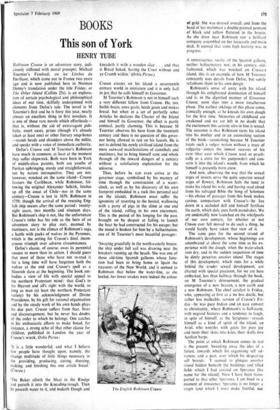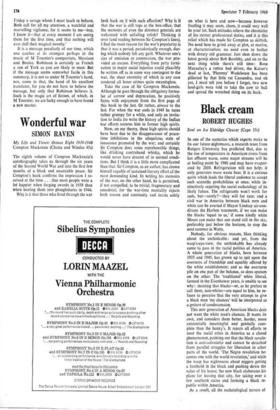This son of York BOOKS
HENRY TUBE
Robinson Crusoe is an adventure story, judi- ciously stiffened with moral precepts; Michael Tournier's Vendredi, ou les Limbes du Pacifique, which came out in France two years ago and is now published here in. Norman Denny's translation under the title Friday, or The Other Island (Collins 25s), is an explora tion of certain psychological and philosophical ideas of our time, skilfully underpinned with elements from Defoe's tale. The novel is M Tournier's first and he is forty- this year, nearly always an excellent thing in first novelists. It is one of those rare novels which effortlessly— that is, without the aid of extravagant pub- licity, court cases, prizes (though it's already taken at least one) or other literary soap-boxes —stands heads and shoulders above the melee, and speaks with a voice of immediate authority.
Defoe's Crusoe and M Tournier's Robinson have much in common, at least at the moment they suffer shipwreck. Both were born in York of middle-class parents, both are youths of Puritan upbringing, sturdy and straightforward, not by nature introspective. They are not, however, wrecked on the same island—Crusoe favours the Caribbean, while Robinson, fol- lowing the original Alexander Selkirk, fetches up off the coast of Chile—nor in the same century—Crusoe is lost in 1659, Robinson in 1759; though the arrival of the rescuing Eng- lish ship occurs after the same period: twenty- eight years, two months and nineteen days. But Robinson's ship is not, like the unfortunate Crusoe's (who has his role as the hero of an adventure story to play -out), manned by mutineers, nor is the climax of Robinson's saga.. a battle with packs of. wolves in the Pyrenees, which is the setting for Crusoe's final, incon- gruous triumph over adverse circumstances.
Defoe's classic, of course, owes its perennial success to more than its action. I should guess that most of those- who have not re-read it for a long time will have forgotten both the wolves at the end and Crusoe's spell as a Moorish slave at the beginning. The book em- bodies a view of life with special appeal to
the northern Protestant mind: that God's in his Heaven and all's right with the world, so long as man (at least the northern Protestant variety) by his acknowledgment of Divine Providence, by his gift for rational organisation and by the steady work of his own hands plays his due part. Crusoe suffers from fear, fever and discouragement, but he never has doubts of the order to which he belongs. One catches in his enthusiastic efforts to make bread, for instance, a strong echo of that other classic for children, published in London the year of Crusoe's wreck, Orbis Pictus:
It is a little wonderful, and what I believe few people have thought upon, namely, the strange multitude of little things necessary in the providing, producing, curing, dressing. making, and finishing this one article bread.' (Crusoe.)
`The Baker sifteth the Meal in the Rindge and putteth it into the Kneading-trough. Then he poureth water to it, and maketh Dough and kneadeth it with a wooden slice . . . and thus is Bread baked, having the Crust without and ye Crumb within.' (Orbis Pictus.) Crusoe creates on his island a seventeenth century world in miniature and it is only half in jest that he calls himself its Governor.
M Tournier's Robinson is not in himself such a very different fellow from Crusoe. He, too, builds boats, sows grain, herds goats and makes bread, but when in a set of perfectly sober Articles he declares the Charter of the Island and himself its Governor, the effect is partly comical, partly alarming. This is because M Tournier observes his hero from the twentieth century and there is no question of this gover- nor being allowed to rest on his laurels. He is not to defend his newly civilised island from the mere outward manifestations of cannibals and mutineers, but to bring himself sane and whole through all the inward dangers of a century without a satisfactory explanation for the universe.
Thus, before he can even arrive at the governor stage, symbolised by his mastery of time through the construction of a water- clock, as well as by his discovery• of his own footprint embedded in a rock (his personal seal on the island), Robinson must suffer the ignominy of reverting to the bestial, wallowing with a party of pigs in the slime at one end of the island, rolling in his own excrement. This is the period of his longing for the past, brought on by despair at failing to launch the boat he had constructed for his escape; but the mood is broken for him by a hallucination, one of M Tournier's most beautiful passages: `Swaying gracefully in the north-easterly breeze, the ship under full sail was drawing near the breakers running up the beach. She was one of those old-time Spanish galleons whose func- tion had been to bring home to Spain the treasures of the New World, and it seemed to Robinson that below the water-line, as she heeled, her lower strakes were indeed the colour The English Robinson Crusoe of gold. She was dressed overall, and from the head of her mainmast a double-pointed pennant of black and yellow fluttered in the breeze. As she drew near Robinson saw a brilliant company assembled on her forecastle and main deck. It seemed that some high festivity was in progress. . .
A reminiscence, surely, of the Spanish galleon, neither hallucinatory nor, in his century, old- fashioned, which was wrecked on Crusoe's island, this is an example of how M Tournier constantly uses details from Defoe, but subtly refashions them to his own design.
Robinson's sense of unity with his island through his enlightened domination of himself and it, in the dignified manner of Governor Cnisoe, soon slips into a more treacherous phase. The earliest inklings of this phase come, ironically enough, as he kneads his own dough for the first time. Memories of childhood are awakened and we are left in no doubt that the excitement this activity stirs in him is sexual.
The outcome is that Robinson turns his island into his mother and in an astonishing section of the book—astonishing because M Tournier
treats such a vulgar notion without a trace of vulgarity—enters the inmost recesses of his cave (that cave which Crusoe used so practi-
cally as a store for his gunpowder) and con- verts it into the island's womb, from which he himself is presently born anew.
And now, observing the way that the sexual urges of insects serve the quite separate sexual urges of flowers, Robinson feels the need to make his island his wife, and having read aloud from his salvaged Bible the Song of Solomon —his choice of passages from this book makes curious comparison with Crusoe's—he lies down in a secluded dell and himself fertilises the earth, which duly puts forth mandrakes. We are undeniably now launched on the whirlpools of our own century, for whether or not Crusoe ever felt moved to do such a thing, he would hardly have taken that view of it.
The same goes for the second strand of Robinson's development, whose beginnings are adumbrated at about the same time as his ex- perience with the dough, when the water-clock runs dry, and in the sudden suspension of time he dimly perceives another island. The stages of this development, which runs for a while behind the cruder sexual development, are charted with special precision, for we are here embarked, less than halfway through the book, on M Tournier's denouement, the gradual emergence of a new heaven, a new earth and a new Robinson. The chief catalyst is Friday, who, appearing at first as a no less docile, but rather less malleable, version of Crusoe's Fri- day--he was pure Indian and an easy convert to christianity, where Robinson's is half-caste, with negroid features and a tendency to laugh, in spite of himself, at the Scriptures—reveals himself as a kind of spirit of the island, an Arid, who wrestles with goats for pure joy and turns their skins into kites, their skulls into Aeolian harps.
The point at which Robinson comes to rest is the present. Sweeping away the idea of a future, towards which his organising self ad- vances, and a past, over which his despairing self broods: 'I seemed to glimpse another island hidden beneath the buildings and tilled fields which I had created on Speranza [his name for the island]. Now I have been trans- ported to that other Speranza, I am fixed in a moment of innocence. Speranza is no longer a virgin land which I must make fruitful, nor Friday a savage whom I must teach to behave. Both call for all my attention, a watchful and marvelling vigilance, for it seems to me—nay, I know it—that at every moment I am seeing them for the first time, and that nothing will ever dull their magical novelty.'
It is a message peculiarly of our time, which one catches at its strongest perhaps in the music of M Tournier's compatriots, Messiaen and Boulez. Robinson is certainly as French a son of York as you are likely to meet. But if the message seems somewhat facile in this summary, it is not so under M Tournier's hand, nor, come to that, the hand of his excellent translator, for you do not have to believe the message, but only that Robinson believes it. Such is the magic art of fiction, of which, in M Tournier, we are lucky enough to have found a new master.







































 Previous page
Previous page